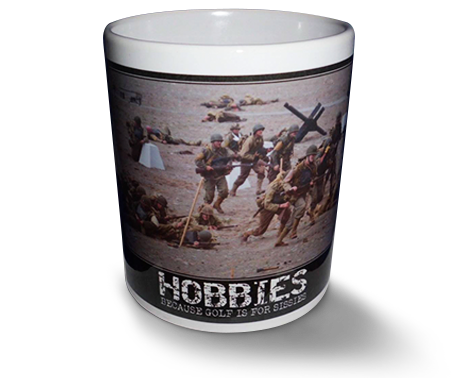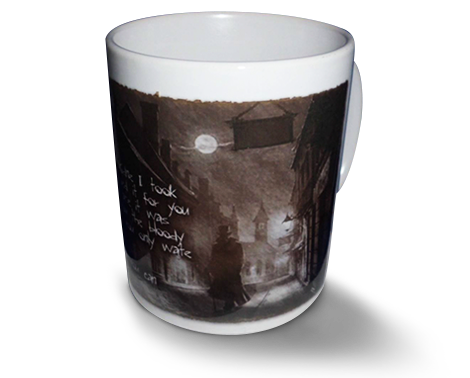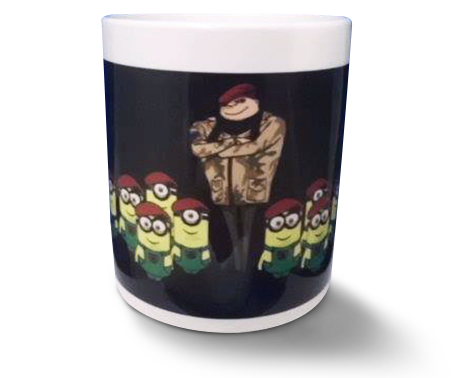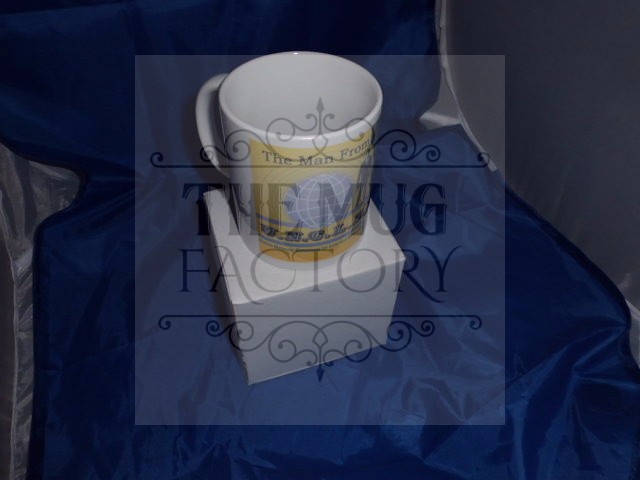The man from uncle personalised mug
11oz man from uncle mug
In the early 1960s, CIA agent Napoleon Solo and KGB operative Illya Kuryakin participate in a joint mission against a mysterious criminal organization, which is working to proliferate nuclear weapons.
The Man from U.N.C.L.E. is an American spy fiction television series broadcast on NBC. It follows secret agents, played by Robert Vaughn and David McCallum, who work for a secret international counter-espionage and law enforcement agency called U.N.C.L.E. Originally, co-creator Sam Rolfe wanted to leave the meaning of U.N.C.L.E. ambiguous so it could refer to either "Uncle Sam" or the United Nations. Concerns by the Metro-Goldwyn-Mayer (MGM) legal department about using "U.N." for commercial purposes resulted in the producers' clarification that U.N.C.L.E. was an acronym for the United Network Command for Law and Enforcement. Each episode had an "acknowledgement" to the U.N.C.L.E. in the end titles.
The series premiered on September 22, 1964 and discontinued its run on January 15, 1968.
The series centered on a two-man troubleshooting team working for U.N.C.L.E. (United Network Command for Law and Enforcement): American Napoleon Solo (Robert Vaughn), and Soviet Illya Kuryakin (David McCallum). Leo G. Carroll played Alexander Waverly, an English head of the organization. Barbara Moore joined the cast as Lisa Rogers in the fourth season.
The series, though fictional, achieved such cultural prominence that props, costumes and documents, and a video clip are in the Ronald Reagan Presidential Library's exhibit on spies and counterspies. Similar U.N.C.L.E. exhibits are in the museums of the Central Intelligence Agency and other US agencies and organizations gathering intelligence.
UNCLE: The organization
Main article: U.N.C.L.E.
U.N.C.L.E. is an acronym for the fictional United Network Command for Law and Enforcement, a secret international intelligence agency, consisting of agents of all nationalities.
THRUSH: The main adversary[edit]
U.N.C.L.E.'s primary adversary was THRUSH (WASP in the pilot movie). The original series never divulged who or what THRUSH represented, nor was it ever used as an acronym. However, in the U.N.C.L.E. novels written by David McDaniel it is the Technological Hierarchy for the Removal of Undesirables and the Subjugation of Humanity,[6] described as having been founded by Col. Sebastian Moran after the death of Professor Moriarty at the Reichenbach Falls in the Sherlock Holmes story, The Final Problem.
THRUSH's aim was to conquer the world. Napoleon Solo said, in "The Green Opal Affair", "THRUSH believes in the two-party system — the masters and the slaves," and in the pilot episode ("The Vulcan Affair"), THRUSH "kills people the way people kill flies — a reflex action — a flick of the wrist." THRUSH was considered so dangerous an organization that even governments who were ideologically opposed to each other — such as the United States and the Soviet Union — had cooperated in forming and operating the U.N.C.L.E. organization. Similarly, when Solo and Kuryakin held opposing political views, the friction between them in the story was held to a minimum. Although executive producer Norman Felton and Ian Fleming conceived Napoleon Solo, it was producer Sam Rolfe who created the U.N.C.L.E. hierarchy. Unlike national organizations like the CIA and James Bond's MI6, U.N.C.L.E. was a global organization of agents from many countries and cultures. Illya Kuryakin was created by Rolfe as just such an agent, from the Soviet Union.
The creators decided an innocent character would be featured in each episode, giving the audience someone with whom to identify. Despite many changes over four seasons, "innocents" remained a constant — from a suburban housewife in the pilot, "The Vulcan Affair" (film version: To Trap a Spy) to those kidnapped in the final episode, "The Seven Wonders of the World Affair".
Filmed in color from late November to early December 1963 with locations at a Lever Brothers soap factory in California, the television pilot made as a 70 minute film was originally titled Ian Fleming's Solo and later just Solo. However, in February 1964 a law firm representing James Bond movie producers Harry Saltzman and Albert R. Broccoli demanded an end to the use of Fleming’s name in connection with the series and an end to use of the name and character "Solo", "Napoleon Solo" and "Mr. Solo". At that time filming was under way for the Bond movie Goldfinger, in which Martin Benson was playing a supporting character named "Mr. Solo". The claim was the name "Solo" had been sold to them by Fleming, and Fleming could not again use it. Within five days Fleming had signed an affidavit that nothing in the Solo pilot infringed any of his Bond characters, but the threat of legal action resulted in a settlement in which the name Napoleon Solo could be kept but the title of the show had to change.
The role of the head of U.N.C.L.E. in the pilot was Mr. Allison, played by Will Kuluva, rather than Mr. Waverly played by Leo G. Carroll, and David McCallum's Illya Kuryakin only had a brief role. Revisions to some scenes were shot for television, including those needed to feature Leo G. Carroll. The pilot episode was re-edited to 50 minutes to fit an hour time slot, converted to black and white, and shown on television as "The Vulcan Affair".
NBC in New York was not happy with the pilot. An executive wanted to drop someone but could not remember his name, saying "K — K — " and Felton replied "Kuluva?" and the executive replied "'That's it.'" Felton did not argue as he wanted to replace Kuluva anyway. Felton later told the executives he wanted to replace Kuluva with Leo G. Carroll. When the executive asked who was the actor Leo G. Carroll had replaced, Felton responded "Will Kuluva" and the executive said he meant David McCallum — Kuryakin. He wanted to get rid of the Russian and thought Carroll too old to be Solo's sidekick. Felton said the contracts had been signed.
Additional color sequences with Luciana Paluzzi were shot in April 1964 and added to the pilot for MGM to release it outside the United States as a second feature titled To Trap a Spy. It premiered in Hong Kong in November 1964. The extra scenes were reedited to tone down sexuality and used in the regular series in the episode "The Four-Steps Affair".
The show's first season was in black and white. Rolfe created a kind of Alice's Adventures In Wonderland world, where mundane everyday life would intermittently intersect with the looking-glass fantasy of international espionage which lay just beyond. The U.N.C.L.E. universe was one where the weekly "innocent" would get caught up in a series of fantastic adventures, in a battle of good and evil. Rolfe also blended deadly suspense with a light touch, reminiscent of Hitchcock. In fact, U.N.C.L.E. owes just as much to Alfred Hitchcock as it does to Ian Fleming, the touchstones being Notorious (1946) where an innocent is recruited by a professional spy organization and North by Northwest (1959), where an innocent man is mistaken for an agent of a top-secret organization, one of whose top members is played by Leo G. Carroll. This role led directly to Carroll being cast as Mr. Waverly in the show.
U.N.C.L.E. headquarters in New York City was most frequently entered by a secret entrance in Del Floria's Tailor Shop. Another entrance was through The Masque Club. Mr. Waverly had his own secret entrance. Unlike the other TV series I Spy (also on NBC) however, the shows were overwhelmingly shot on the MGM back lot. The same building with an imposing exterior staircase was used for episodes set throughout the Mediterranean area and Latin America, and the same dirt road lined with eucalyptus trees on the back lot in Culver City stood in for virtually every continent of the globe. The episodes followed a naming convention where each title was in the form of "The ***** Affair", such as "The Vulcan Affair", "The Mad, Mad, Tea Party Affair", and "The Waverly Ring Affair", etc. The only exception was "Alexander the Greater Affair," parts 1 & 2. The first season episode "The Green Opal Affair" establishes that U.N.C.L.E. uses the term "Affair" to refer to its different missions.
Rolfe endeavored to make the implausible elements in the series seem not only feasible but entertaining. In the series, frogmen emerge from wells in Iowa, shootouts occur between U.N.C.L.E. and THRUSH agents in a crowded Manhattan movie theater, and top-secret organizations are hidden behind innocuous brownstone facades. The series began to dabble in science fictional plots, beginning with "The Double Affair" in which a THRUSH agent, made to look like Solo through plastic surgery, infiltrates a secret U.N.C.L.E. facility where an immensely powerful weapon called "Project Earthsave" is stored; according to the dialogue, the weapon was developed to protect against a potential alien threat to Earth. The Spy with My Face was the theatrical film version of this episode.
Switching to color, U.N.C.L.E. continued to enjoy huge popularity. Succeeding Rolfe, who left the show at the conclusion of the first season, new showrunner David Victor read articles that called the show a spoof, and consequently that is what it became. Over the next three seasons, five different show runners would supervise the U.N.C.L.E. franchise, and each one took the show in a direction that differed considerably from that of the first season. Furthermore, U.N.C.L.E. had spawned a swarm of imitators. In 1964, it was the only American spy show on U.S. TV; by 1966, there were nearly a dozen. In an attempt to emulate the success of ABC's mid-season hit Batman, which had proved hugely popular with its debut in early 1966, U.N.C.L.E. moved swiftly towards self-parody and slapstick.
This campiness was most evident during the third season, when the producers made a conscious decision to increase the level of humor, though season two had moved in this direction in episodes such as "The Yukon Affair" and "The Indian Affairs Affair." With episodes like "The My Friend the Gorilla Affair" (which featured a scene in which Solo is shown dancing with a gorilla), the show tested the loyalties of its fans. This new direction resulted in a severe ratings drop, and nearly resulted in the show's cancellation. It was renewed for a fourth season and an attempt was made to go back to serious storytelling, but the ratings never recovered and U.N.C.L.E. was cancelled midway through the season.
Reunion TV movie
Main article: Return of the Man from U.N.C.L.E.
A reunion telefilm, Return of the Man from U.N.C.L.E. subtitled The Fifteen Years Later Affair, was broadcast on CBS in America on April 5, 1983, with Vaughn and McCallum reprising their roles, and Patrick Macnee replacing Leo G. Carroll, who had died in 1972, as the head of U.N.C.L.E. A framed picture of Carroll appeared on his desk. The movie included a tribute to Ian Fleming via a cameo appearance by an unidentified secret agent with the initials "J.B." The part was played by George Lazenby who was shown driving James Bond's trademark vehicle, an Aston Martin DB5. One character, identifying him, says that it is "just like On Her Majesty's Secret Service", which was Lazenby's only Bond film.
The movie, written by Michael Sloan and directed by Ray Austin, briefly filled in the missing years. T.H.R.U.S.H. has been put out of business, and the remaining leader was in prison. (His escape begins the story.) Illya, who quit U.N.C.L.E. after a mission went sour and an innocent woman was killed, now designs women's clothing at Vanya's in New York. Napoleon was pushed out of U.N.C.L.E., and now is employed selling computers. He still carries his U.N.C.L.E. pen radio for sentimental reasons and this is how the organization is able to contact him after so many years.
Solo and Kuryakin are recalled to recapture the escapee and defeat T.H.R.U.S.H. once and for all, but the movie misfired on a key point: instead of reuniting the agents on the mission and showcasing their witty interaction, the agents were separated and paired with younger agents. Like most similar reunion films, this production was considered a trial balloon for a possible new series which never materialized.






